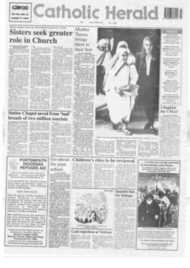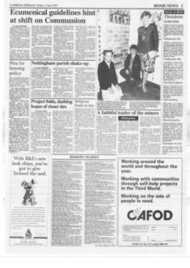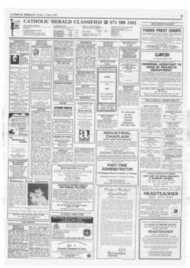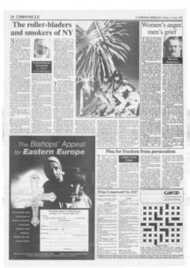Page 7, 11th June 1993
Page 7

Report an error
Noticed an error on this page?If you've noticed an error in this article please click here to report it.
Tags
Share
Related articles
Not A-verse To Conviction
So Is Poetry Only For The Young?
Close Look At Complex Poet
Cajoling Poetry Out Of Detail And Vision
In Brief
From W.H Auden to Al Pacino
Genevieve Fox talks to Catholic poet Elizabeth Jennings about poetry, love, cinema and everything
ELIZABETH Jennings's reflective poetry and the periods of doubt and depression in her personal life do not prepare you for such a sparky character. Identifiable at a distance by the entourage of plastic bags at her feet and the maroon beret and duffle coat, worn in spite of the sunny day, the 66-year-old poet is installed at a table in her favourite Oxford cafe. Jennings has been coming here for three years, to chat to other regulars, to conduct interviews, occasionally to write a poem. Spared the clearing away of crockery meted out to other customers, she is left in respectful peace.
Her handbag, worn across her chest and stuffed full of papers, provides a convenient metaphor for her eclectic mind. She offers an opinion on everything from the ordination of women ("fundamentally unsuitable. I don't think I trust them") , to Freud ("done as much damage as Marx"), and Madonna's latest movie Body of Evidence ("pornographic").
For more than 40 years Jennings has been one of Britain's major poets, coming to prominence in 1955 when she won the Somerset Maugham Award. Numerous accolades have followed in the years since, including the W H Smith Literary Award and, last year, a CBE. But she has never achieved a high public profile, a neglect she harbours no bitterness about.
"No, I don't feel discriminated against. I've been lucky. But poetry is a difficult job. I don't really like it and I don't like unkind reviews. And there have been periods of such ghastly penury that I've often had to sell books, even my own work. My father was very generous and I've collected books since I was 15."
Born in Bolton, Lincolnshire, in 1926, her father was a doctor and a Catholic convert. Her family moved to Oxford when Jennings was six. The poet and the person are linked particularly closely in Jennings and the poems concern nature, art, and her much loved Rome, society's foibles, love divine and secular friendship and childhood. Tributes include special homages to her mother, "the sweetest most gentle woman," whose death two years ago has intensified Jennings's own vulnerability, and is best captured in "V Sudden Remembrance," the fifth of ten poems in a series entitled For My Mother "Orphaned and elderly and yet a child For so I am when thoughts of you return, Return and batter me and I'm not mild But close to rears and scarred for these tears burn, You tamed me when most wild..."
Accident prone and plagued by headaches and blackouts, Jennings nevertheless recalls her childhood as a lost Golden Age. While other children were amusing themselves with dolls or playing Cowboys and Indians, she was either talking to her imaginary brother, Jack Baycock, who lived in the garage, or simulating Mass with her sister, using a toy stove as a makeshift tabernacle and gibberish for Latin.
"I envied the boys lighting candles and swinging incense," says Jennings, laughing. "I had a very rich imaginative life."
But for a sensitive child with a vivid imagination, the darker side of Catholicism provided a breeding ground for doubt and fear. "First Confession" records the dread inspired by the confessional's "impersonal grille". Introspection set in, "awful storms of fear" raging before each confession thereafter. Her teenage years were to be the worst of her life. "I showed all the classic signs of a juvenile delinquent. I just had this terrible rage. I shall never forget that feeling of being beside yourself, out of control. Oh! I wouldn't have 15 to IS again. All the inward turning, the doubts, the difficulties."
Poetry was to be the lifelong outlet for this tumultuous inner life and by 15 she was already writing steadily. After reading English at Oxford, Jennings worked at Oxford City Library for eight years followed by two years at Chatto in the late 1950's. But working, and socialising whilst also trying to write proved too much for Jennings and in 1960 she had a nervous breakdown, leading to two years in a psychiatric hospital followed by years of therapy. "To say I didn't get on very well with the doctors is an understatement."
An engagement at Oxford and various love affairs never led to marriage. "I wouldn't have been a good proposition for marriage. I jump out of bed to write poems. I don't like housework. I think I like being independent. I am a romantic and I don't think romance lasts. I can't bear things ending."
Home is a rented room in north Oxford where she is surrounded by a cherished collection of dolls' houses, Dinky cars, books and musical boxes. "The only good thing about not being a millionaire." she suggests cheerily, "is that you wouldn't have the fun of collecting."
Film and theatre are other favourites but, says Jennings, "I usually sleep at the beginning of every film I see because I don't sleep much at night. I nearly always have to go two or three times. My lifelong pin-up is John Gielgud."
This sets in motion praise for a gallery of stars which includes the "wonderful" Kenneth Branagh, Al Pacino, whose performance in Scent of a Woman" she deems "extraordinary" ("It's about human goodness. I've been to see it umpteen times"), the Queen ("and not just because she gave me an award"). and the "swept" Sue Lawley. "I was so thrilled to be on Desert Island Discs. I was visibly shaking."
In fact, with the exception of John Major and Margaret Thatcher, she doesn't have a bad word for anybody. "I like looking up to people. I hate cynicism." She is knowledgeable and effusive about favourite poets Auden, Eliot ("a great man-) and Catholic staples like Hopkins and Walter de la Mare. Even the misanthropic Philip Larkin she found to be "delightful and charming". Of herself she says that she would like to be remembered "as someone who wrote good poems..."
The "sure days of childhood" longed for in "An Age of Doubt" have never returned. "I often have doubt," she says, into a long pause. "I think everybody does, don't you? What I find very difficult is to think what it's like when the spirit is taken away from the body.
Jennings's biggest fear is "the fear of never being able to write again. Sometimes I feel that an act of the imagination is more use than an act of faith."
AT this time, Dr Forster says that people should guard against colds, and above all, against the contagion of typhus and other fevers, which are apt to prevail in the early spring. "Smoking tobacco," he observes, "is a very salutary practice in general, as well as being a preventative against infection in particular.
The best tobacco is the Turkey, the Persian and what is called Dutch canaster. Smoking is a custom which should be recommended in the cottaees of the poor. and in the great populous towns liable to contagion".
This was written about 1826 and the message I get from it is that doctors are not to be trusted. Half the time they don't know what they're talking about and the rest of the time they're bullying us.
Today we have doctors
who a re proposing that inveterate smokers should not be treated for illness which
they have brought on
themselves from persisting in the habit, while other doctors are still suggesting that smoking protects the body from certain afflictions:colitis, schizophrenia and alzheimer's for instance, if my memory serves me right. (It may not, for I've been cutting down recently and this undoubtedly has a deleterious effect on the concentration).
Many people have already inquired indignantly whether the first group of doctors
blog comments powered by Disqus











